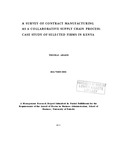| dc.description.abstract | The study was carried out to determine if there was any competitive advantage when
organizations undertake contract manufacturing in Kenya. The firms selected represent
different sectors in Kenya’s manufacturing industry. The organizations are large by
Kenyan standards employing over 100 people, they also subscribe to continuous
improvement and good manufacturing practices.
Primary data was collected from oral interviews carried out from respondents while
secondary data was collected from secondary sources such as company journals, websites
and reports. Methods of data collection involved in depth personal interviews guided by a
questionnaire which was structured to cover the objective of the study by having sections
specific to the four key critical areas of production costs, transport logistics,
manufacturing contracts and performance measuring systems. The respondents were
senior personnel in the organizations. The research used content analysis to analyze the
responses; this is a systematic qualitative technique for compressing data into fewer
content categories based on the set research objectives to understand what lies behind a
given result
On the key identified aspects that are critical to manufacturing, the study concludes that
Kenya rates highly as an off-shore destination to consider when seeking a contract
manufacturing relationship. This is a profitable venture as revealed with benefits, among
them being speed to market for the finished goods for the contracting organization,
business profitability and use of available capacity by the local organization offering the
service with the overall contribution towards Kenya’s development through creation of
jobs and the generation of revenue and foreign exchange earnings. The areas identified as
requiring improvement include bureaucracy experienced from the Kenya Revenue
Authority (KRA) interface, the high cost and unreliability of power supply and the
congestion at the import handling facilities of the Kenya Ports Authority (KPA), these
areas need to be addressed immediately for Kenya to attract more contract manufacturing
ventures and to retain its competitive advantage over other regional countries. | en |

